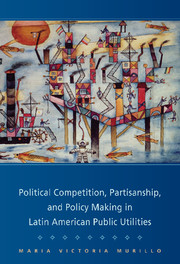Book contents
- Frontmatter
- Contents
- List of Acronyms
- Acknowledgments
- Introduction
- 1 Voice and Light
- 2 Political Competition and Policy Adoption
- 3 Casting a Partisan Light on Regulatory Choices
- 4 Postreform Regulatory Redistribution in Chile
- 5 Postreform Regulatory Redistribution in Argentina and Mexico
- 6 A Multilevel Analysis of Market Reforms in Latin American Public Utilities
- 7 Conclusion
- References
- Index
- Titles in the series
2 - Political Competition and Policy Adoption
Published online by Cambridge University Press: 05 June 2012
- Frontmatter
- Contents
- List of Acronyms
- Acknowledgments
- Introduction
- 1 Voice and Light
- 2 Political Competition and Policy Adoption
- 3 Casting a Partisan Light on Regulatory Choices
- 4 Postreform Regulatory Redistribution in Chile
- 5 Postreform Regulatory Redistribution in Argentina and Mexico
- 6 A Multilevel Analysis of Market Reforms in Latin American Public Utilities
- 7 Conclusion
- References
- Index
- Titles in the series
Summary
This chapter focuses on the effects of political competition on the timing of the adoption of market-oriented reforms, given the strong financial and technological pressures on Latin American governments to attract private capital to public utilities from 1985 to 2000. Given those pressures, in any given year in the studied period, political competition made incumbents less likely to adopt policies that might make them lose marginal supporters while amplifying the reach of challengers' criticisms in the policy debate. The first part of this chapter tests this argument for the decision to adopt privatization, the opening of markets to private investment, and the establishment of regulators in electricity and telecommunications in all Latin American countries. Based on a coauthored piece (Murillo and Martinez-Gallardo 2007), it uses survival analysis to show that political competition hindered the adoption of public-utility reforms in all Latin American countries between 1985 and 2000, even when the effect of financial and technical pressures as well as institutional constraints are controlled for. The second part of the chapter illustrates the causal mechanisms behind this argument by using case studies of both sectors in Argentina, Chile, and Mexico.
Political Competition and Public-Utility Reform
Political competition raised the marginal value of discontented voters when power differentials between incumbents and challengers (the most-voted-for alternative party in Latin American presidential systems) were shrinking. Incumbents became more afraid of being replaced due to popular discontent and thereby more risk averse regarding public-utility reforms whose price effects threatened public discontent.
- Type
- Chapter
- Information
- Political Competition, Partisanship, and Policy Making in Latin American Public Utilities , pp. 55 - 98Publisher: Cambridge University PressPrint publication year: 2009

